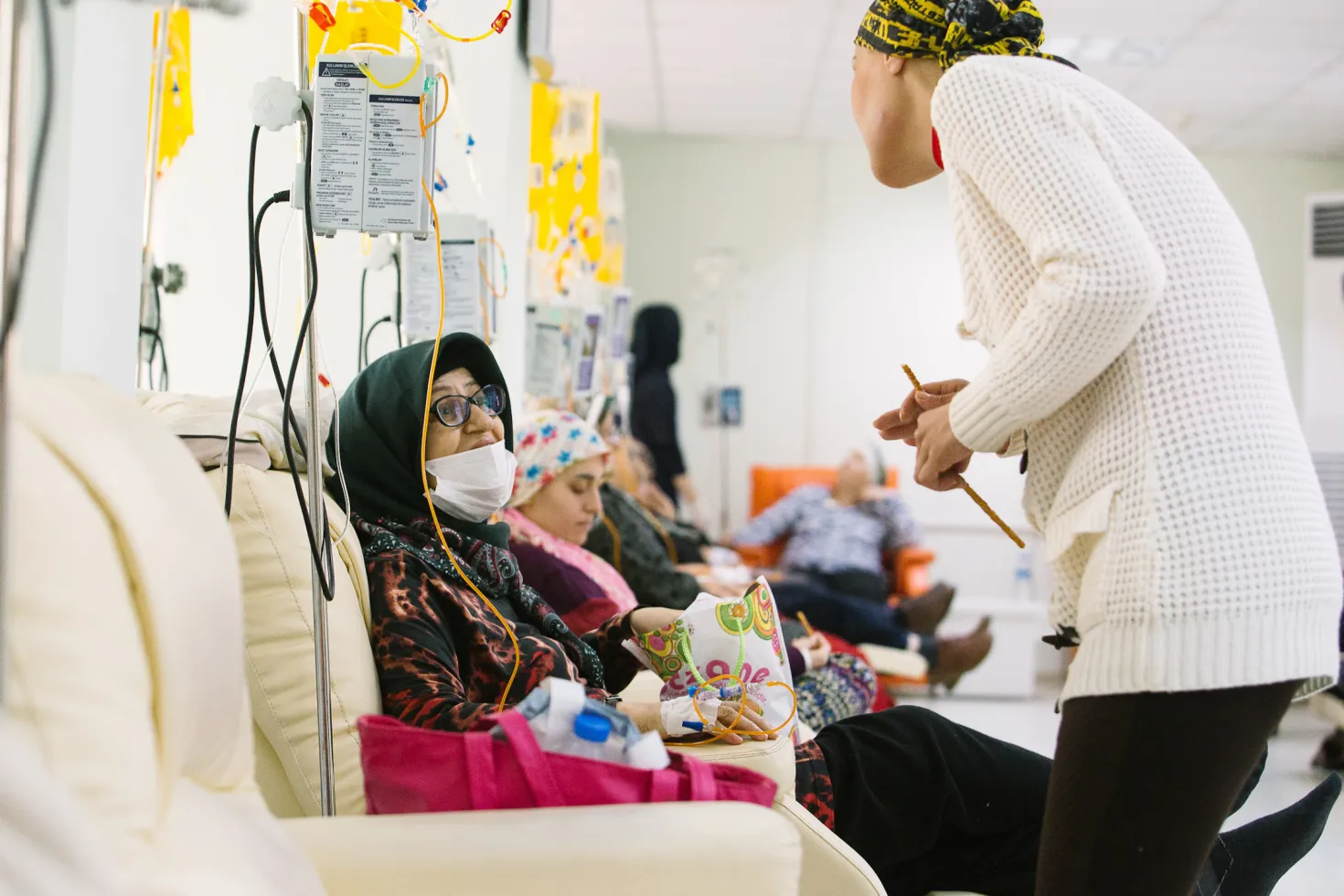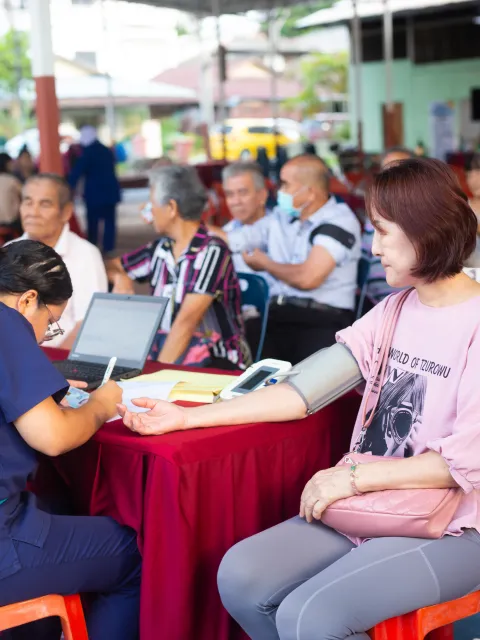Jordan Breast Cancer Program: How Arab nations are tackling breast cancer
UICC staff attended the second conference of the Jordan Breast Cancer Program (JBCP) in June, which looked at how to address the rise in breast cancer incidence and mortality in the Eastern Mediterranean, in particular by using integrated approaches.

HIGHLIGHTS
- Breast cancer is the leading cause of cancer in Arab League countries, attributed to Western lifestyles, reproductive changes and tobacco consumption.
- Limited healthcare access, lack of awareness, cultural stigmas and gender roles hinder early detection of breast cancer.
- The Jordan Breast Cancer Program (JBCP) focuses on improving early detection, raising awareness, and fostering partnerships to combat breast cancer in Arab League countries.
Breast cancer, the most commonly diagnosed cancer among women globally, has also become the leading cause of cancer in Arab League countries. The Eastern Mediterranean Region, of which many Arab nations are part, recorded breast cancer as the most prevalent new diagnosis in 2020, contributing to 31.9% of new cases among women.
The second conference of the Jordan Breast Cancer Program (JBCP), “Integrated approaches for breast cancer control”, looked at some contributing factors to this situation and how to address them. In Jordan, breast cancer accounts for 34.5% of all cancer cases among Jordanian women. The JBCP was a recipient in 2021 of a UICC grant to organise five advocacy workshops to lead national policy reform and unite the country in providing free early detection services for Jordanian women.
Organisations from 13 countries, many of them members of UICC, were present at the Conference. Laura Fernandez Diaz, Senior Manager at UICC, presented UICC's Breast Cancer programme, offering insight into the importance of collaborative efforts to address the high incidence of breast cancer in the Eastern Mediterranean region.
In many low- and middle-income countries (LMICs) such as Jordan, the increase in breast cancer incidence has been attributed to the rise in life expectancy, adoption of Western lifestyles and changes in reproductive practices (delayed first childbirth, fewer pregnancies and shorter periods of breastfeeding.
Smoking, notably the increasing consumption of shisha – in Lebanon, for instance, nearly half of women (46.2%) smoke waterpipe, and more than twice as many as those who smoke cigarettes – has also been identified as a significant risk factor for breast cancer.
Complicating matters, women in low- and middle-income countries are typically diagnosed at a younger age compared to high-income countries (which may be linked to increased tobacco consumption) – and at more advanced stages due to low rates of screening for early detection, where the disease is more curable, survival rates are higher, and treatment costs are lower.
In Jordan, for example, only 18.6% of Jordanian women between the ages of 40-69 have undergone mammography in the past two years, according to the Jordan Cancer Registry.
“At the Jordan Breast Cancer Program, we work on integrating breast cancer early detection at a primary health care level, 90% of people’s health needs can be met at the primary health care according to the World Bank and other studies. We train doctors, nurses and family general physicians on how to counsel women and refer them to specialists as well as on clinical breast examination and breast health promotion and awareness. We also work with primary health care centres where we have placed mammography machines to ensure that these are used for screening and not just for diagnosis.”
– Dr Reem Al-Ajlouni, Director of Jordan Breast Cancer Program
Barriers to early detection
Limited availability of quality healthcare services, a structured early detection programme, diagnostic tools and trained healthcare professionals can result in delayed diagnosis and treatment.
Even when these services are available, however, a lack of awareness or limited knowledge about breast cancer symptoms, risk factors and the importance of early detection can act as significant barriers preventing women from seeking timely medical help.
Cultural contexts and stigmas surrounding women's reproductive health can often deter women from seeking an early diagnosis. For instance, emphasising modesty and privacy may discourage women from discussing or seeking medical attention for breast-related issues. There may be a fear of social repercussions and being ostracised.
Furthermore, traditional gender roles can affect women's decision-making power and agency regarding their health, sometimes relying on male family members to make healthcare decisions.
"A woman with cancer faces all forms of discrimination, starting with access to reliable information, quality cancer care, lack of psychological support and lack of appropriate housing facilities during her outpatient treatment. The social injustice is even greater when the woman becomes a victim of stigmatisation by her family, relatives, professional environment, and is judged by her physical appearance. At worst, she is abandoned, most often by her husband, fired from her job, driven into debt to support herself, denied medical insurance, salary increases, and loses her responsibilities, promotion and benefits when she returns to work."
– Bahija Gouimi, President of l’Association des Malades Atteints de Leucémies (AMAL), Marocco, in an op-ed published in L’Economiste
Rising to the challenge
The JBCP has been working towards improving the availability and quality of early detection services, raising public awareness about breast cancer, advocating for policies that support breast cancer control practices and implementing mammography programmes.
JBCP emphasises a holistic and integrated approach to women's health and non-communicable diseases (NCDs), integrating messages about general NCD prevention and women empowerment and working through partnerships to deliver quality health services.
To ensure the sustainability of its efforts, the JBCP has fostered partnerships with different organisations – including numerous national, regional and international entities – to implement integrated projects focused on women's health.
In particular, the JBCP has led 14 national and seven regional mass breast cancer awareness campaigns and taught women about the importance of early detection and screening, reaching more than 364,000 women.
These initiatives show promising results in changing social behaviours and breast cancer screening, early detection and prevention control practices.
Furthermore, efforts by JBCP have improved the training of healthcare providers and led to 85% of breast imaging units being upgraded in Jordan.
“As government and non-government entities in Arab League countries continue their joint efforts to address the breast cancer crisis, a multifaceted approach involving policy change, healthcare improvement, social awareness and women empowerment will be essential in creating a healthier future for women.”
– Laura Fernandez Diaz, Senior Membership Development Manager, UICC
Last update
Wednesday 05 July 2023
